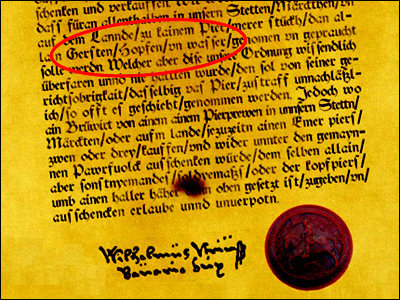
By ANDREW POWELL
Published: April 23, 2016
MUNICH — Before there was Food Babe, there was Duke Wilhelm IV of Bavaria (reign 1508–1550), a man who valued good music and liked his beer free of nettles, sawdust, roots, and other 16th-century “adjuncts,” as unwelcome food ingredients are now termed.
Wilhelm made musical history in 1523 by hiring Ludwig Senfl as musicus intonator after Holy Roman Emperor Karl V wound down the Senfl-led imperial Hofkapelle. The move enabled him to attract top musicians and clone in Munich that standard-setting body, planting the seeds of the Bavarian State Orchestra.
But his most fondly remembered creation was the Purity Order, or Reinheitsgebot, issued 500 years ago today, on April 23, 1516, and still, Gott sei Dank, indirectly in force.
Beer was to be brewed only from barley, hops and water. Malting was understood. (Science did not identify yeast until the 17th century.) Expanding on earlier local laws, the order applied across the state. It set prices too, specifying the sale of beer at no more than one Pfennig per liter in winter, no more than two in summer, and sending echoes down the centuries that beer should be affordable. Today in Germany, 500 ml of beer can cost less than 500 ml of water.
Enforcement of the Reinheitsgebot throughout the newly unified Germany was a condition in 1871 for Bavaria’s joining with Prussia. Only in 1987 did the order technically go off the books, a casualty of E.U. rules of fair trade. Some viewed it as protectionist. Wilhelm’s strictures returned a few years later, though, in the guise of an E.U.-tailored statute: non-compliant German beers could not be labeled “Bier,” but non-German beers could carry that descriptor if they revealed what they were made from.
Such remains the law today, and it is why Food Babe can frame this rhetorical question: “Don’t you find it interesting that AB InBev is required to [list the ingredients of] Corona in Germany but not [in the U.S.]?”
As the North Carolina activist pursues transparency on caramel coloring, chemically altered hop extract, carrageenan, corn, corn syrup, dextrose, E-numbered anything, genetically engineered anything, fish bladder, insect-based dyes, monosodium glutamate, propylene glycol alginate and rice — all present in one or other beer sold now — she can thank music-loving Wilhelm for showing they have nothing to do with pure beer.
Photo © Bayerische Staatsbibliothek
Related posts:
Portraits For a Theater
Petrenko to Extend in Munich
Petrenko Hosts Petrenko
Jansons! Petrenko! Gergiev!
Verdi’s Lady Netrebko
Tags: Bavarian State Orchestra, Bayerisches Staatsorchester, Beer, Duke Wilhelm IV, Food Babe, Germany, Ludwig Senfl, München, Munich, News, Reinheitsgebot